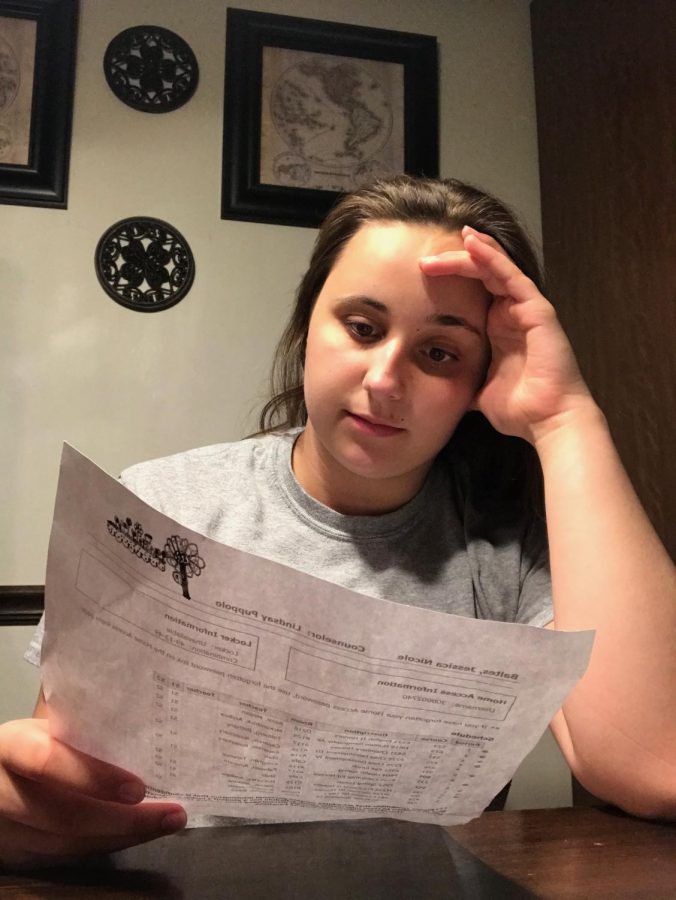Students struggle to find right class levels with limited options
One student sits in the back of the class on their phone and still gets an A, while another student suffers through a confusing lecture, failing every paper they turn in. Every kid has different needs, and they need classes and teachers that are right for them.
With three categories for students to choose from, (College Prep, Honors, and Advanced Placement), students already have a hard enough time picking their classes. However, in some cases, the options are even more limited. There are some classes with only AP and CP options, and students say that the honors option is greatly missed.
“ I definitely feel like there’s a little more wiggle room when it comes to honors. I took an AP class last year and it was rough,” Lilliana Perez, sophomore, said. “I’m always up for challenging myself, but to a point… I don’t want to run myself into the ground. Honors classes are great because you get challenged while still getting the assistance you need.”
While honors is a great course level for advanced students who want to learn at a fast pace, that is not always the case. A lot of the time, Honors is a mix between less qualified students and uber-prepared ones. A great example of this is the Honors English I course, which 75% of incoming freshmen go into.
“There are so many people enrolled in the course, and I think honors should be specific to those who exceed in the subject,” Katie Choi, freshman, said. “The probability of 75% of freshmen exceeding in the same subject is very low, that whole group of us isn’t crazy smart or anything.”
This Honors English I class is just one of many honors classes that are treated like standard classes rather than the accelerated classes they should be. Teachers seem to just be lumping students together into this middle ground between more advanced and average, but that isn’t what honors are. However, teachers have a reason for putting such a broad spectrum of students together like this.
“Students are placed into English I Honors by their 8th grade teacher. The 8th grade teacher takes into account each student’s performance in class and MAP score (standardized taken in elementary and middle school),” Lauren Katzman, English Department Chair, said.
The thing is, MAP scores and other standardized tests are most definitely not the best way to decide what class level a student should go into. These statewide tests do not always reflect how a student is performing in class, and the content in these tests do not always match up with what is learned in class. Katzman went on to say that students can change class levels despite teacher recommendations.
“[If] a student is placed into CP English I, he/she can request a level change, with parent approval, into English I Honors during the waiver period in February,” Katzman said. “The opposite, requesting a change from English I Honors to English I CP, can be done during the waiver period as well.”
Students say that the ability to be waived into classes is generally a good thing, but that it is not always the best action.
“I think it’s okay if people want to go from honors to CP, to drop down. I feel like you can find what level works for you, but I think you should have a teachers recommendation to move up a level,” said Jessica Baltes, a sophomore who has been in an AP history class in which people have been waived, said. “Certain teachers will work at different paces depending on the class, and I feel like they want people who can keep up and not hold back the class.”
Sometimes waiving is particularly necessary in the case of classes with only two options (CP and AP). Students say that the options are too limited for certain courses they want to take, and that it just doesn’t make sense for certain classes to lack an Honors option.
“There’s a calculus AB, then there’s a calculus BC and both are AP. [Calculus] AB is supposed to prepare you for [calculus] BC, and you would expect an honors option for that, but there isn’t,” Jawad Alam, junior, said. “It’s kind of confusing, I don’t really know the reason.”
Teachers of those courses say that the AP options make much more sense than honors options. The courses are at such high levels, and the students that would take them are usually go -getters. Alam says that he himself is an ambitious student, and personally believes AP classes are a good replacement for honors classes.
“[An AP class] helps your GPA more than an honors course would, and the work ethic in an AP class isn’t much different than in an honors class. An honors class is also fast-paced; it’s for students who are more dedicated, more willing to improve,” Alam said. “You’ll see that a lot in AP classes as well, there might be more content, but the pace is very similar.”
In some cases, the options for higher level classes are fine as they are. But for students that want to learn at a fast pace but not get overloaded with work, choices are less than desirable.
“I think there’s a large gap between [CP and AP] and honestly I don’t think it’s good for the students who are on the verge of which class to take,” Perez said. “Some might choose to move up and end up regretting it or move down and not be challenged at all, either way the student loses.”

As a senior, this is Max’s third year on staff and first year as magazine editor in chief for the Bear Facts program. He aspires to study environmental...


Kaine Osbrun • Aug 24, 2018 at 9:10 am
I am glad that Bear Facts staff continue to look at academic life; student perspectives on academic experiences and their relationship to success and, yes, stress, are important. The challenging aspect is balancing that perspective – specific students over a discrete period of time – to a longer, bigger view that teachers and administrators have when they see multiple classes, thousands of students over the years, go through LZHS. And teachers and admin see external research data too. All of that experience and research indicates that too many levels does little for student learning over time and that most students at high schools like LZHS – high performing, affluent communities with resources – are well positioned to excel in Honor and AP courses. In some cases Honors courses are so similar to AP courses that it makes no sense to offer an Honors option of a course. Often the issue is that the distinction between Honors and AP is the perception of the difference rather than the reality. Such was the case when Honors Physics became AP Physics. The only difference was one single unit of study. However, something that every teacher, student, parent, and counselor should be aware of is balance. (And our counselors are amazing in this regard.) Simply and only taking AP courses out of fear of GPA effects, etc is not healthy. Every student should seek a balance. I am a very public proponent of AP and The College Board. But I don’t believe a student should seek to take too many AP courses. Rather, I believe students should assess with counselors and parents what is the right balance in any given year that will still encourage a student to ‘stretch’ themselves appropriately and prepare themselves for post-secondary learning. That is a conversation, not about any single course, but about a bigger perspective. Thanks to Max for putting this piece together.